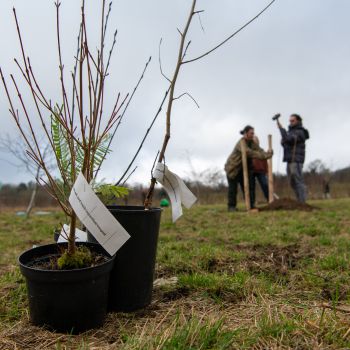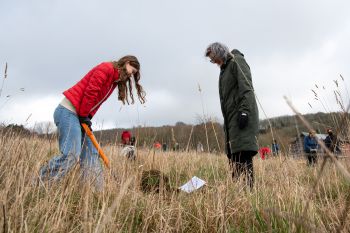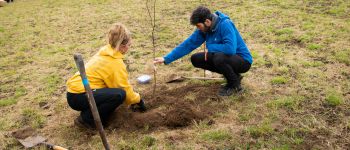News
Find out about the latest sustainability news at the University of Sussex.
They came, they saw, they planted: Creating a forest food garden on campus
By: Heather Stanley
Last updated: Tuesday, 22 February 2022

Staff volunteers work with students to plant the forest food garden (1)

Staff volunteers work with students to plant the forest food garden (2)

Staff volunteers work with students to plant the forest food garden (3)

Staff volunteers work with students to plant the forest food garden (4)
On a perfect sunless but fortunately dry and relatively windless afternoon in February, Dr John Parry (Senior Lecturer in Education), together with his course colleagues, Dr Perpetua Kirby and Daphne Lambert, and students on the Department of Education’s forest food garden elective course teamed up with 20 staff volunteers from across campus for some serious tree planting.
John explained:
“Part of the idea (for today) was definitely to have faculty and students talking to one another. I’m hoping that the students might be talking about metaphor, because this isn’t just about planting trees. It’s about what does this place say to us and what is it going to say to future generations.”
Callum, an English undergraduate in his second year on the forest garden elective course, added:
“It’s a collaboration. It’s like, when I’m 40, we’ll still have 18, 19, 20 year olds doing this right here. Each cohort passing on the baton to the next. But planting is the main thing now. And then the planning of a social space which we hope will be a bit of a retreat.”
22 students from a wide variety of disciplines are currently on the two-year forest food garden elective module who have taken it for various reasons, not all of which are connected to their main degree subject. What they all seem to have in common, however, is their enjoyment of and enthusiasm about it.
Isabella, an Anthropology student, said:
“[When] everything was on Zoom, we were in Halls and it was dark and winter-y and the pandemic was at its height. It seemed really nice to be doing something active and that you can envision for the future. It’s nice to think that we’re caring for nature and people in the future.”
Mou, a Biology student, said:
“I like gardening and flowers. I do a lot of gardening at home. (The module is) interesting. It’s not what I thought it would be and I didn’t know what I wanted it to be, but I feel that it is what I want it to be now I’m doing it.”
Leo, a Biology student, said:
“I’m a biology student so I like plants and stuff. I didn’t really know what this was about […] until I got access to the Canvas site. It’s very nice. I’m really enjoying it.”
John is keen to highlight the dual aspects of the course in terms of scientific data but also philosophy and the place of metaphor in such sites, evoking such names such as John Dewey (American philosopher, psychologist, and educational reformer whose ideas have been influential in education and social reform), Michael Oakeshott (English philosopher and political theorist who wrote about the philosophy of history, religion, aesthetics, education and law) and Marianne Krasny (Director of the Cornell Civic Ecology Lab where she conducts research on the connections between community environmental stewardship, individual environmental actions, and wider systemic change). The fact that the students are from different disciplines he believes makes the course all the more interesting.
John is well qualified for his role. Recognised with the award of an MBE in 2017 for his community work in environmental education, John’s interest in the environment stems back to his Welsh childhood. He was instrumental in getting sustainable development as an entitlement in the national curriculum in 1999 for which he was part of a working group answering to Whitehall. He worked in a special school for eight years making environmental films with young people, at which time he was also a founding member of a trust that championed the creation of a local nature reserve in Lewes served by the Linklater Pavilion which the Trust opened in 2010. He is currently creating his own remote forest garden in Wales.
It is understandable how John’s drive, passion and enthusiasm inspires his students. But on this day he has also inspired 20+ volunteers to leave their desks for three hours and learn how to plant a tree. The volunteers were certainly as enthusiastic, if not more, than the students …
Peter Rycroft, post-doc researcher in Psychology, said:
“This felt like a good thing to do. We don’t really work with our hands at the University, so it seems satisfying. It’s a very nice thing to plant trees. I always walk around here, so it feels nice to contribute to expanding the forest.”
Alan Stewart, Professor of Ecology in Life Sciences, said:
“I helped John in the early days looking for an appropriate site and kept tabs on it ever since. I have some plots of my own on the hill over there where we’re trying to recreate species-rich chalk grassland. So when John mentioned wanting a site for a Forest Food Garden I suggested this one. The idea is that perhaps my project, this project, and perhaps a hempcrete building that he wants to build, will come together with the student allotments as a kind of student-focused collection of activities at this end of campus.”
Greg Toth, working in compliance and data protection within the data management team, said:
“I sit in an office all day but I love nature. So when I saw this I immediately signed up. I want to come back in 25 years and see the impact we’ve made. It’s brilliant. I really like this.”
Juliet Richardson, Communications & Engagement Officer with the Susses Sustainability Research programme, said:
“I knew about the Forest Food Garden electives from the website, but not much else. I’d never visited this site. I wanted to find out more about the elective - and meet other members of staff. I’ve never actually planted a tree myself before either, so I wanted to learn how to do that. It’s also a really nice opportunity to get outside. A change from sitting in front of a screen all day.”
Simon Thompson, Professor of Education and Head of the School of Education and Social Work, said:
“I’m here because of my colleague John’s passion for this project and the enthusiasm he generates amongst students and faculty. There have been several cohorts completing our Forest Food Garden elective and its thanks to their vision, commitment and multi-disciplinary expertise that we are here today. They should take great pride in what they’ve achieved and what they’ll share with generations at Sussex”.
The tree planting has been a long time in the planning and the culmination of the efforts of many. The course was initiated by John, but has become a collaboration. From Sussex, key course contributors include module co-convenors John and Dr Perpetua Kirby - who brings her transformative sustainability education expertise - and Daphne Lambert, Nutritionist - who brings a wealth of knowledge about growing foods, their nutrition and preservation. But John’s connections are wide and varied. Martin Crawford (British author and founder and director of the Agroforestry Research Trust who runs courses in the design of Forest Gardens) not only visited and advised on the site and John’s vision for it, but grew (organically, of course) the trees that are being planted. Martin subsequently put John in touch with Arit Anderson, garden designer and television presenter on Gardener’s World, who did a Zoom call with the forest garden students and suggested a connection with KLC School of Design in London. Led by Humaira Ikram, Garden Design Diploma Course Leader, 25 adult KLC design students will visit Sussex in May to work on professional designs, taking into account the right plants for the soil and other specific environmental and social aspects of the Sussex forest food garden site. These will be presented in September thereby providing a rich box of delights from which future Sussex students can choose for advancing their own design ideas.
Will the trees survive and thrive? Will the team get their hempcrete building? Will there be a social space at the forest garden site this time next year? Might lessons be taught there eventually? And what of the bee sanctuary I heard mention of? It’s all up for grabs and it’s all wonderfully ‘uncertain’ – a major framing of this term as it happens!